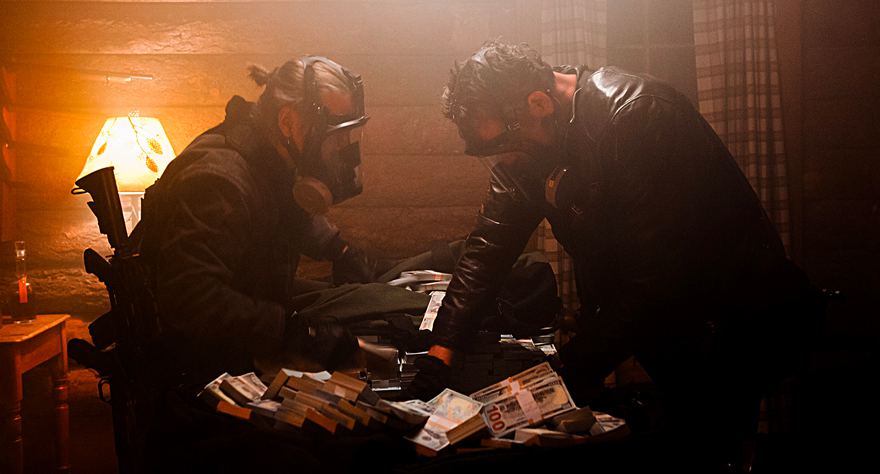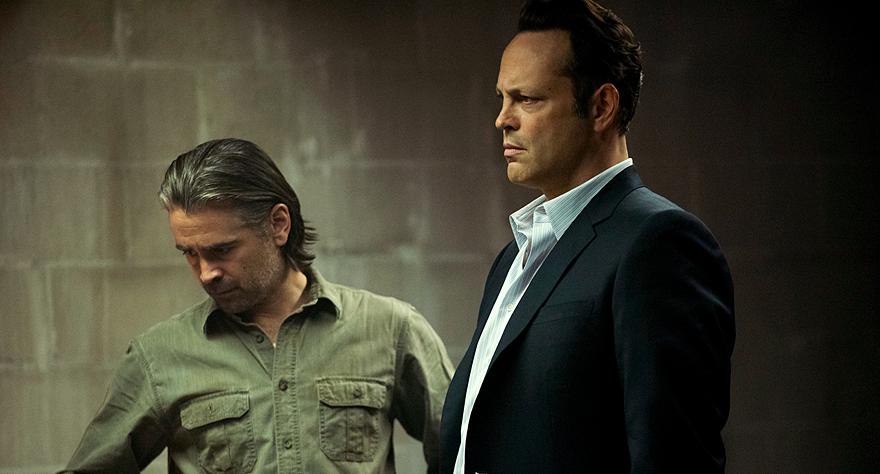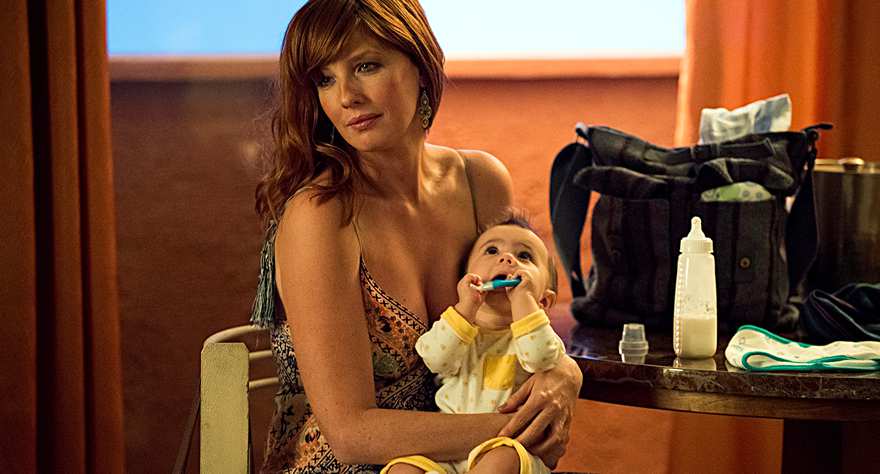‘True Detective’ Season 2 Finale & Season Review Roundtable

Season two of True Detective came to its crooked and sinewy ending last night in “Omega Station” (directed by Brooklyn director John Crowley) where all the dangling threads of this disputed second season were either wrapped up, stamped out, or set on fire. There’s been a lot of hate for this season as this LA-based tale of corruption played out over the past eight weeks, but we stuck with it and the time has come to process.
First, a breakdown of last night’s episode. Spoilers ahead, obviously.
The episode began in typical doleful fashion with Ani Bezzerides and Ray Velcoro, our sole-surviving detectives on the lam, post-coitus and of course wallowing in their shared brokenness. Ani contemplates the recently surfaced memories of her childhood abduction, feeling guilt over liking that her abductor called her “pretty.” Ray continues to grapple with the truth that the vengeful murder of his ex-wife’s rapist, an event that has come to define his life, was all a lie. Meanwhile Frank Semyon tries to send Jordan off to safety in Venezuela by pretending to insult her, she strikes back with a well-placed “you’re a terrible actor.” Zing!
Ray tries to get ahold of Paul, and when Lt. Burris answers he realizes poor little Paul Woodrugh is dunzo. Burris reveals his plot to pin all of this on Ray. Ani and Ray freak out for a moment before connecting some rather loose dots: they know Erica/Laura, Caspere’s assistant, is the grown-up child that witnessed her parents’ murder in ‘92, but what about her brother? Ray conjectures (rather wildly) that he’s the set-photographer, Lenny, we met briefly in episode three. Ani and Ray go to Lenny’s house, Ray sees the bird head costume his masked assassin wore and then they stumble upon the missing Erica/Laura. Little sister spills all, revealing rather anticlimactically that the murder this entire story began around—the death of Caspere—was committed by the vengeful Lenny who’s now on his way to finish what he started and kill the crooked cops who murdered his parents. Ray gets to him in time before he can go through with it, but when Lenny listens in to the conversation Ray has with Holloway—more convenient exposition under the guise that Ray is striking a deal with a dead hard drive—his anger gets the best of him and he attacks Holloway. They both die in the ensuing shootout. Ani swoops in to run away with Ray.
Ray and Frank team up to take on the Russians, massacring them at a cabin in the woods and taking off with their money to fund their escape. But these characters are riddled with hubris and Ray can’t help but stop off to see his son one last time allowing Burris a free minute to put a tracker on his car. Ray has no choice but to lead him away from Ani, heroic perhaps, but resulting rather predictably in a last stand in the woods. Ray doesn’t make it and adding insult to injury, his dying message to his son fails to send. Frank has some pretty rotten luck as well, getting sidetracked by Mexican gangsters and ending up stabbed and penniless (except those hidden diamonds!) in the desert where he proceeds to not only die, but be visited by apparitions of those who both love and hate him.
Ani makes it out on the boat to Venezuela. Burris lives and gets the young Tony Chessani elected as mayor—did I mention he murdered his own father? Who knew he was so ambitious? Ani meets up with Jordan, apparently has Ray’s baby, and passes off all the evidence she has to a writer to finally expose the events that have transpired. She, Jordan, and Nails the loyal henchman, walk off into a Venezuelan crowd toward some indeterminate future.
Here’s what we thought:

[Ananda]
I was not among the naysayers who disliked Season Two early on. Knowing the way things went with season one, I gave the writers the benefit of the doubt that they would take every last second to tell their tale and thus knew I’d be watching every episode. And they did take every last second…but the cramming of explanation and consequence in the last episode proved that they could have been much thriftier with all those used seconds. Many of those dots connecting in the end could have connected earlier with no detriment to the finale. It’s one thing to build a mystery, it’s another to Scooby-Doo a story by sending everyone running for seven episodes and then pull off masks for an hour and a half in the finale.
The logic leaps made in the case were pretty erratic in the end. Actually quite a few people who barely existed within the show came out on top. Tony Chessani is a kid in a speedo in one episode and then rather inexplicably ends up more on top than anyone. Lenny the set-photographer is our super-secret murderer and masked bird-man assassin and yet his reveal is so sudden, and his next move so quickly thwarted, that all these revelations fizzle quickly and pretty soon we’re thinking “Caspere? Caspere who?” If you’re going to spend years plotting revenge—which his house full of photos and evidence would suggest—why act so impulsively and erratically when justice is just on the horizon?
Ok, fine, so side characters don’t get real character development, we mostly care about our three “true” detectives anyways. Paul seemed a little expendable from the get-go, the disadvantage of working for a lesser police organization—CHP, seriously?—and because he just couldn’t seem to figure out what he even wants in life. Similarly, Ray had a bit of an X on his back for being a generally corrupt cop and iffy father, but it seemed like he was headed for redemption by finally involving himself in something that might change things for the better. And maybe Pizzolatto was responding to the flack he got for last season’s treatment of its female characters, but this season he over-corrected severely in giving all these dudes such dramatic endings and allowing the women to escape, but into lives of exile.
So, is any real justice done this season? Our detectives used their skills and cracked the case, but for what? Even in their mutual flawed state, last season’s Cohle and Hart were able to get to a more positive place. Their determination came from a need to eradicate evil, whereas our detectives this season were constantly just trying to keep their heads above water and save themselves.
They may all be messed up cops, but the difference in the origin of each season’s evil—a crazy killer in the first season and a corrupt judicial system in the second—really makes all the difference. At least Hart and Cohle could believe in the value of their toiling, this season’s detectives were allowed almost no silver linings and nary a light in their tunnels. True Detective Season Two’s bleakness stemmed from the cloud looming over their heads, not just the smog that defines Los Angeles.
[Zach]
Coming off the tail end of a convoluted second season, I’m still attempting to parse my way through True Detective’s multitude of conspiracies, cover-ups, and double-crosses while wondering how much any of it mattered. In the end, Ben Caspere’s murderer turned out to be a day player with impulse control issues; the hard drive with the damning evidence of corruption had already been bricked; Frank Semyon chose his suit jacket over his life.
To be honest, I lost the connecting thread of Season Two sometime after the high body count shootout that ended episode four. Pizzolatto took his show in so many directions without ever finding an organically cohesive element to bring those episodes together. It was a show about entrenched corruption. It was a show about damaged children who grew up defining themselves by their trauma. It was a show about the futility in finding fulfillment through redemption. It was a show about Stan. And ultimately, it was a show about evil winning out over good. But it was rarely successful at conveying all those stories at once.
While it would have been reasonable to assume Pizzolatto a misanthropic person from the first season of True Detective, last night’s finale all but confirmed it. The moment that sticks out as bleak for bleakness’ sake has to be when Ray Velcoro inexplicably leads his pursuant tail to the redwood forests rather than buy himself some time in an area with cell service. In our final moment with Season Two’s most notable character and actor, his final message to his son fails to upload. Velcoro was not always a stellar dad in eight episodes, but not allowing him even this minor win feels unrelentingly cruel.
When I look back on this season of True Detective, I’ll mostly remember how little I cared. For most of the season Pizzolatto & Co. tested the limits for endless, self-serious, vapid conversations in darkly lit bars to the tune of bummed out singers. Last night, they pushed the amount of exposition characters can deliver in a finale to the extreme. So little of it ever registered with me on my first watch of a given episode. Two days from now I won’t be able to explain to you what the blue diamond heist was or who was involved.
Whereas Cohle and Hart improbably but mercifully made it out alive at the end of the last season, three of season two’s main characters were offed to little effect. It mattered to me when Velcoro appeared to be shot down in episode two, but by the time Vince Vaughn was limping through the desert, getting teased by an anonymous, imagined group of young men, these characters had all done enough incoherent mumbling for a lifetime. There existed some flashes of intrigue, exhilarating moments, and occasionally memorable lines of dialog in this season. Mostly, True Detective’s second season left me looking for more satisfying answers. Thankfully the Internet helps to fill in some of the unexplained gaps, but I resent the need for a Spark Notes study guide to watch such mediocre TV.

[Nik]
Well, thank God that’s over.
A lot of the same frustrations I’ve had with the finale have already been summed up, so I’m afraid my reaction won’t provide much balance, just more bludgeoning. Nic Pizzolatto should take a long vacation and think real hard on how to handle a possible third season (too soon?), otherwise he’ll be remembered as something of a one-season-trick pony. Season One contained exemplary, layered world-building and immersive character development paving the way for a climax that froze our emotions with fear, only for a positively unpredictable and life-affirming resolution to thaw them. That the same writer managed to follow-up something like that, with something like…this…is a more compelling mystery than anything that happened over the course of the past eight weeks in the made-up town of Vinci and to its half-baked, morose, characters. Or should I say “splenetic,” to go in line with the kind of vocabulary these sanctimonious gangsters and corrupt cops tend to drop in casual convos? There should be a GIF of Ray and Frank talking about how apoplectic they’re feeling, a GIF that would sum up True Detective’s mind-numbingly self-indulgent second season to a tee.
What’s funny is that I, like Ananda, wasn’t hating on the second season from the start. I was enjoying the vibe even if it was heavy-handed, I was getting attached to the characters (well, let’s be honest; to Ray), I was digging the pensive scene transitions and the bird’s-eye-view cinematography of the snake-like urban LA jungle. But, sometime around Frank and Jordan’s thirteenth baby conversation, before Colin Farrell’s husky Texan drawl grew into a parody of itself, and long after I stopped caring about who killed a corrupt asshole politician; I got tired and realized that the opening theme song was developing and evolving more convincingly than any character this season (seriously, the use of Leonard Cohen’s “Nevermind” is the only true highlight here). If a season only has eight episodes, and five of them feel like they’re spinning wheels on matters no one cares about, jumping through time like Doc Brown on speed, and introducing further layers of corruption and cartoonish villainy (I’d put money that there’s concept art of Austin Chessani in some Looney Tunes artist’s basement) to hammer the same fucking point across; I’m sorry, but that season is a major fail.
In that respect, HBO’s prez Michael Lombardo made a point when he claimed that the finale is “enormously satisfying.” After an enormously disappointing five and a half episodes, with a few lightning-fast glimpses of greatness and the painful experience of watching four fine actors trying their best with trite dialogue, the finale was satisfactory (let’s not get carried away with big adverbs). Paul was long gone before he was ever a goner, but at least he’ll be remembered as the heroic dude that he actually was, and there was enough emotional investment with Ray’s arc concerning his son and his newly-formed relationship with Ani, that his demise hit all the right chords. Except that I agree with Zach in that the “failed-to-deliver” ender was an unnecessarily bleak twist of the knife. Frank’s end was fitting; stranded alone to bleed to death because of his pride, and Ani—as the truest detective of them all—deserved to get out and imagine what life with Ray would’ve been through their son (let’s face it, the guy was a trainwreck and would’ve probably screwed up somehow had he made it out). Importantly, and in contrast to Season One, there was no place for a happy ending here and Pizzolatto rightly saw to that. The cycle of corruption continues to spin, and well-intentioned characters will make one-too-many terribly human mistakes that’ll get them killed.
If I could give any advice to Pizzolatto, it would be to take his sweet time before writing a third season. Everything that went wrong this season stems from the writing, and it’s painfully obvious how rushed the whole thing was compared to the brilliant first outing. Take your time, don’t give your characters dialogue that sounds like third-person narration from a dollar-bin crime novel, create a mystery that people will actually want to invest in, and for God’s sakes, add more truth to your detectives.
Come to think of it now, there was something enormously satisfying about that finale: we’ll never have to hear that clinically depressed bar singer ever again.
